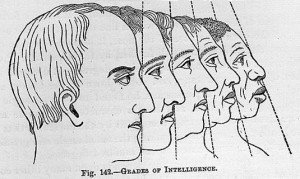Andrew Sullivan:
I’ve touched slightly on the term ‘Israel-Firster’ – a shorthand that has an ugly neo-Nazi provenance, which is why I don’t use it…
As Justin Raimondo pointed out Monday, that etymology is false: the term was first used no later than 1953 by Alfred M. Lilienthal, a Jewish American. Not that that fact will change anything. I expect no correction from Sullivan, and I couldn’t care less about his source, Spencer Ackerman, whose views on intellectual honesty you can read for yourself.
But let’s assume that, for once, they weren’t bullshitting and the term was coined by an asshole. And? Does a sorry origin taint a word or phrase for all eternity, even if the term — as Sullivan effectively admits in the aforementioned post — is accurate and useful in certain cases?
Just for kicks, I searched Sullivan’s blog and Tablet magazine, where Ackerman acted out his latest “plate-glass window” fantasy, for “highbrow,” “middlebrow,” and “lowbrow.” It won’t surprise you to learn that the searches turned up plenty of hits. It may surprise you to learn where those words come from:

“Highbrow,” first used in the 1880s to describe intellectual or aesthetic superiority, and “lowbrow,” first used shortly after 1900 to mean someone or something neither “highly intellectual” or “aesthetically refined,” were derived from the phrenological terms “highbrowed” and “lowbrowed,” which were prominently featured in the nineteenth-century practice of determining racial types and intelligence by measuring cranial shapes and capacities. A familiar illustration of the period depicted the distinctions between the lowbrowed ape and the increasingly higher brows of the “Human Idiot,” the “Bushman,” the “Uncultivated,” the “Improved,” the “Civilized,” the “Enlightened,” and, finally, the “Caucasian,” with the highest brow of all.
– Lawrence W. Levine, Highbrow/Lowbrow: The Emergence of Cultural Hierarchy in America (1988)

Ugly, huh? You can find similar histories for several other commonly used terms (though “rule of thumb,” contrary to a popular myth, isn’t one of them). Will Sullivan and Tablet‘s writers ban the -brows? I doubt it, and really, why should they? If they found those adjectives useful before and had no intention of endorsing phrenology or “scientific racism,” then there’s no reason for us to presume evil motives now.
None of which is to say that some words aren’t overused or shouldn’t be used more carefully. But if “Israel-firster” is one of those terms, then “anti-Semite” is a thousand times more so. You have your work cut out for you, deputies.





